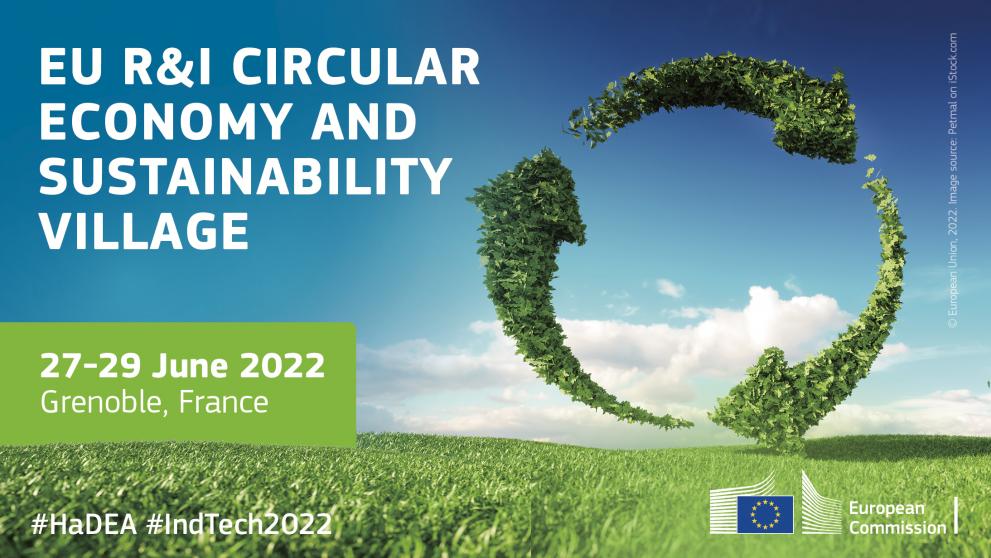
As the green and digital transitions are just in their early stages, major opportunities lie ahead to position Europe as a technological and industrial leader of these processes.
In this context, IndTech2022, the French Presidency’s conference on industrial technologies, aims at improving visibility of such technologies, identifying policy options and priorities, as well as sharing information and points of view. The event kicks off in Grenoble on 27 June and it will provide a space for networking and finding common goals among industry stakeholders.
EU R&I circular economy and sustainability village
The EU R&I circular economy and sustainability village will give you the chance to get in touch with various organisations and talk about their projects and initiatives.
Want a flavour of what you will discover in the village? Meet the H2020 projects managed by HaDEA that are participating to show how their results support circular economy and sustainability:
- AVANGARD intends to develop and demonstrate innovative solutions in the manufacturing industry. The project will test the integration of three innovative units into a micro-factory test bed for urban electric vehicles (I-Bikes, I-Cars and innovative battery packs). AVANGARD will offer a hybrid public-private blockchain based platform for 3D printing technology with increased speed and security.
- ENSUREAL: the objective of ENSUREAL is to develop and optimise a different alumina production process capable of accepting lower grade ores while producing useful by-products such as cast-iron, fertilisers and soil improver, and critical raw material concentrates (REE, Ga).
- HARARE will demonstrate sustainable pathways to produce non-ferrous metals using hydrogen as an enabler. This innovative solution is critical to remove waste and valourise materials in carbon-free processes.
- LEVEL-UP: the aim of LEVEL-UP is to offer a scalable platform covering the overall lifecycle of major capital investments and large industrial equipment. These include the digital twins setup, modernisation actions to diagnose and predict the operation of physical assets, and the refurbishment and remanufacturing activities.
- NanoBat aims to develop a novel nanotechnology toolbox for quality testing of Li-ion and beyond-lithium batteries. Sustainable electricity storage is one of the main challenges of this century. Being faster and more accurate than existing methods, the radio frequency (RF) nanoscale techniques to be developed by NanoBat have the potential to redefine battery production in Europe and worldwide. The clean energy and e-mobility transitions in Europe can greatly benefit from it.
- RECODE aims at recycling carbon dioxide in the cement industry to produce added-value additives, in an effort to move towards a CO2 circular economy.
- SABYDOMA: one of the main goals of the SABYDOMA project is to build high-throughput online platforms where nanomaterials are manufactured and screened at the production point. In addition, the project aims to extend the impact of safe-by-design nanomaterials to real world situations.
- WOOL2LOOP provides new smart demolition and sorting technologies combined with a novel analysis method for mineral wool waste that enables the separation of the material based on its suitability for alkali-activation. Additionally, geo-polymer technology makes it possible to use mineral wool waste as a valuable resource for new ceramic or concrete-type products.
Background information
Horizon 2020 (H2020) was the EU’s multiannual funding programme between 2014 and 2020. H2020 provided Research and Innovation (R&I) funding for multi-national collaboration projects as well as for individual researchers and SMEs via special funding instruments. Horizon 2020 is being followed up by the Horizon Europe programme, which will run until 2027.
Details
- Publication date
- 24 June 2022
- Author
- European Health and Digital Executive Agency
- Programme Sector
- Industry
- Programme
- Horizon Europe
- Horizon Europe Cluster 4: Industry
- Tags
- Digital technology
- EUFunded
- Event
- Industrial research
- Innovation
- Raw material
